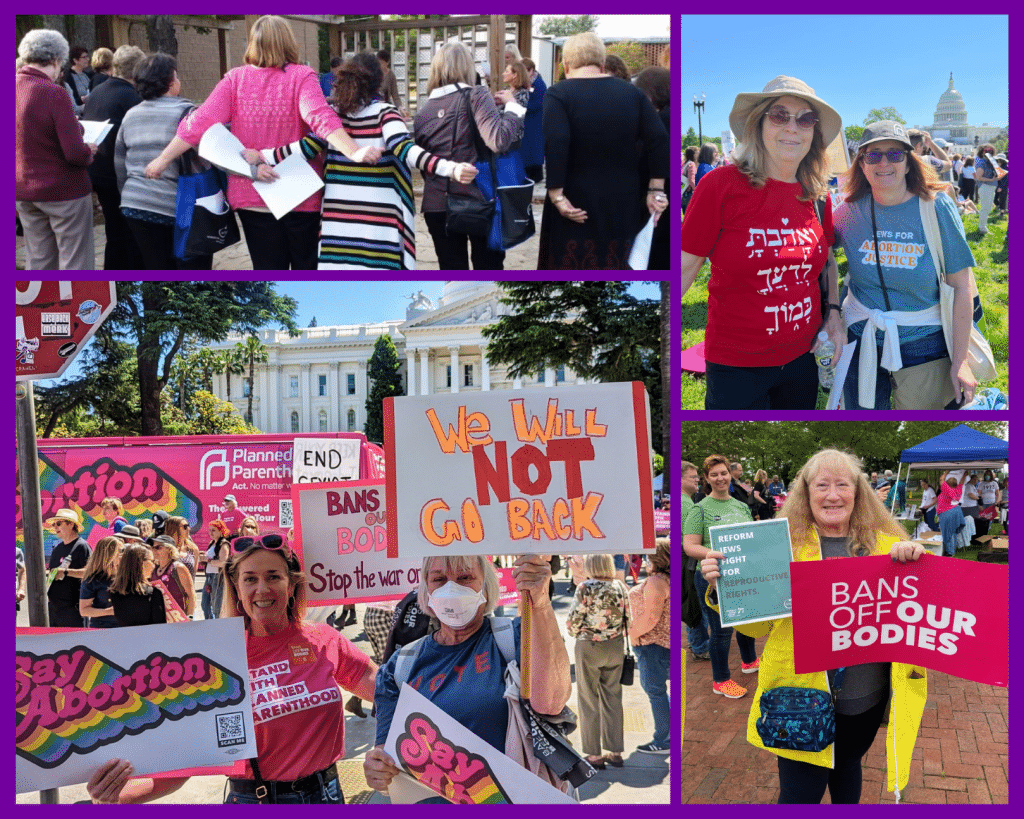
At twelve weeks pregnant, after telling their two-year-old that he was going to be a big brother, Idaho residents Jennifer and John Adkins found out that their fetus had a life-threatening disorder that resulted in a miscarriage in more than 90% of cases.
Their doctors informed them that if they did not terminate the pregnancy soon, Jennifer’s life would also be in danger. However, they could do nothing further to help the couple in post-Roe Idaho with a restrictive abortion ban in place.
In the end, the couple drove six hours north into Oregon to receive abortion care, at a cost of $1,500 for the grieving family.
On Wednesday, the U.S. Supreme Court will hear oral arguments in Idaho v. United States. This crucial case will decide if emergency room doctors must let their patients suffer until the moment of death before they are permitted to perform an abortion that would address serious health conditions.
As Jews around the country prepare to observe Passover next week, we are reminded of the core tenet of this widely celebrated holiday: the obligation to redeem the oppressed and enslaved, to free those whose lives and bodies are at risk. I am a rabbi, a person who has been pregnant, and the leader of the women’s affiliate of the largest Jewish denomination in North America. For me, a ruling in favor of Idaho’s ban presents a clear violation of the Jewish mandate to save a life, above all else.
In 2020, Idaho passed an abortion trigger ban, a law that would ban abortion across the state shortly after Roe was overturned. The Idaho law prevents nearly all forms of abortion, with a narrow carve out for abortions that are “necessary to prevent the death of the pregnant woman.”
After the Dobbs decision erased the constitutional right to an abortion and left the decision about abortion access to the states, the U.S. Department of Justice filed a lawsuit challenging the Idaho abortion ban, stating that it was in defiance of the federally enforced Emergency Medical Treatment and Labor Act (EMTALA). This law guarantees everyone treatment for emergency medical conditions, including any pregnant person who is suffering from an emergency, related to labor or not. Idaho’s abortion ban challenges EMTALA directly because although it allows abortion care if someone is near death, it does not allow for abortion care that could be stabilizing or prevent serious, but not immediately fatal, complications.
A federal district court initially agreed with the Department of Justice, but the ban was upheld on appeal. Until a decision is made by the Supreme Court, the ban remains in effect, barring hundreds of thousands of people from essential health care and senselessly risking lives.
Passover is the Jewish holiday of redemption, and each of us has a part to play in redeeming those who are not yet safe and free, spiritually or physically. As Rabbi Israel Salanter, father of the Mussar movement, is known to have said, “Another person’s material needs are my spiritual responsibility.” In Judaism, life is sacred. In fact, we learn that the injunctive to save a life, pikuach nefesh, is prioritized above all other commandments or values.
In the opening chapters of the Torah, Cain kills his brother Abel. God confronts him with these words, “Your brother’s blood cries out to Me from the ground!” (Genesis 4:10). From this biblical story, the Talmud teaches, “anybody who destroys a single life, it is as if they destroyed an entire world, and for anybody who preserves a single life, it is as if they preserved an entire world,” (Jerusalem Talmud Sanhendrin 4:9).
Banning potentially lifesaving medical procedures and treatment, and thereby interfering with a doctor’s decision-making, runs contrary to the Jewish directive to save a life. From emergency rooms in Idaho, to the Supreme Court, the blood of our siblings and our sisters cry out to us.
Each time that I was pregnant, and, thankfully, had two healthy and safe deliveries, I was acutely aware of the burden and dangers that I faced. Simply being pregnant poses significant short-term and long-term risks to health, particularly in the United States. Among first-world nations, we have the highest rate of serious pregnancy-related complications, resulting in about 700 deaths a year, most of them preventable.
This health burden is unequally distributed, falling hardest on women of color and low-income women — in fact, Black women are three times more likely than white women to die from pregnancy-related complications.
Looking to the case before the Supreme Court next week, unclear definitions of what is “life-threatening,” versus “potentially life-threatening,” or simply “harmful to health” only cause further, unnecessary risk to the lives of pregnant patients. The ambiguity prevents medical professionals from fully ensuring patient safety.
Millions of people have suffered since the overturning of Roe. Here, Jewish values point the way: do not stand by while your neighbor bleeds. Do not abandon women and people who can become pregnant, as their blood cries out from the earth. Save the life of these pregnant individuals, above all else.
About the Author: Rabbi Liz P.G. Hirsch is the executive director of Women of Reform Judaism, the women’s affiliate to the largest Jewish denomination in North America.


